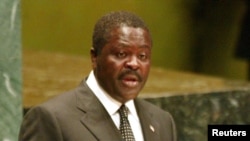As U.S. soldiers arrive in Liberia to help with the fight against Ebola, Liberia’s Minister of Information Lewis Brown is hopeful this will be a turning point for his country. However, he said, more help is needed to stop the epidemic, which has affected Liberia more than any nation in the Ebola zone. For VOA, Benno Muechler interviewed Lewis Brown in Liberia’s capital, Monrovia.
Q: Schools are not running. Many government ministries are not fully working. Is Liberia falling apart?
A: At the moment it doesn’t mean that our country is falling apart. But the truth of the matter is, if nothing is done, if we do not get the kind of support that we’re beginning to see and hear of, and in a rather quick and flexible way, given the unprecedented spread of this virus, we may see that happening. And what we’re trying to do is to work as best as we can to make sure, along with our international partners, that we never get to that point.
Q: So you would see the U.S. involvement right now as a turning point?
A: We’d like to think so. We think that the assistance from the government of the United States is timely. We’d like to see more of such assistance from other governments of the world… Because as this virus continues to attack lives, what is under increasing attack is the livelihood of people: The way people have lived. Businesses have been shut down. So, the economy is grinding to a halt. Our estimates have been projected downward from an estimated 5.9 percent growth potential this year. We’re talking about 2.5 percent. By all counts that is a regression, we’re in a kind of recession. If nothing is done quickly, it could continue to spiral downward.
Q: Many people have complained about the way the government is handling the situation. Sick people were not admitted to health facilities. Entire families have been put under quarantine and were left alone without any support from the government like food and water. What does the government do to help the people of Liberia?
A: Well, look. The spread continues to outpace the rate at which we’re capable to provide the kinds of support we would like to provide... We are stretched very thin as a government. We are taking some very difficult decisions, which we know continues to hurt us in our capacity to improve our collection, our Treasury. But these are measures we must take… because we must cut the human-to-human transmission. So we understand some of these criticisms from our people, but it’s simply that we need assistance, we need it desperately, we need it now.
Q: You said it’s an unprecedented event. It’s unheard of. It took you by surprise. However, didn’t the government make any mistakes?
A: There are always areas where people can improve in human endeavors… But no country on its own, and the experts have indicated this, no country on its own could have solved this. This is why this is properly classified as an international public health crisis. And the United Nations Security Council rightly declared this an international threat to peace and security. The world must stand up and the world must act.
Q: We all hope this crisis will be solved and perhaps it will be in already six months from here. How will this time of crisis change Liberia? What does it mean in the history of Liberia?
A: It means a lot. First of all we have to protect lives. Then we have to protect livelihood. But at the end of the day we have to look at ourselves. This virus has exposed a lot of things about ourselves. The way we have always lived and the need we must feel to change a lot of things about ourselves and about our society… If we don’t go from door to door, from community to community, saying to each Liberian: ‘I’m not safe until you’re safe,’… That sense of community, that sense of commonality of purpose is what we’re finding throughout this tragedy we’re living through. And it gives us hope that we evolve out of this crisis as a much better country and a more unified country, a country more dedicated to its sense of nation-building because we now understand we have a shared destiny.




